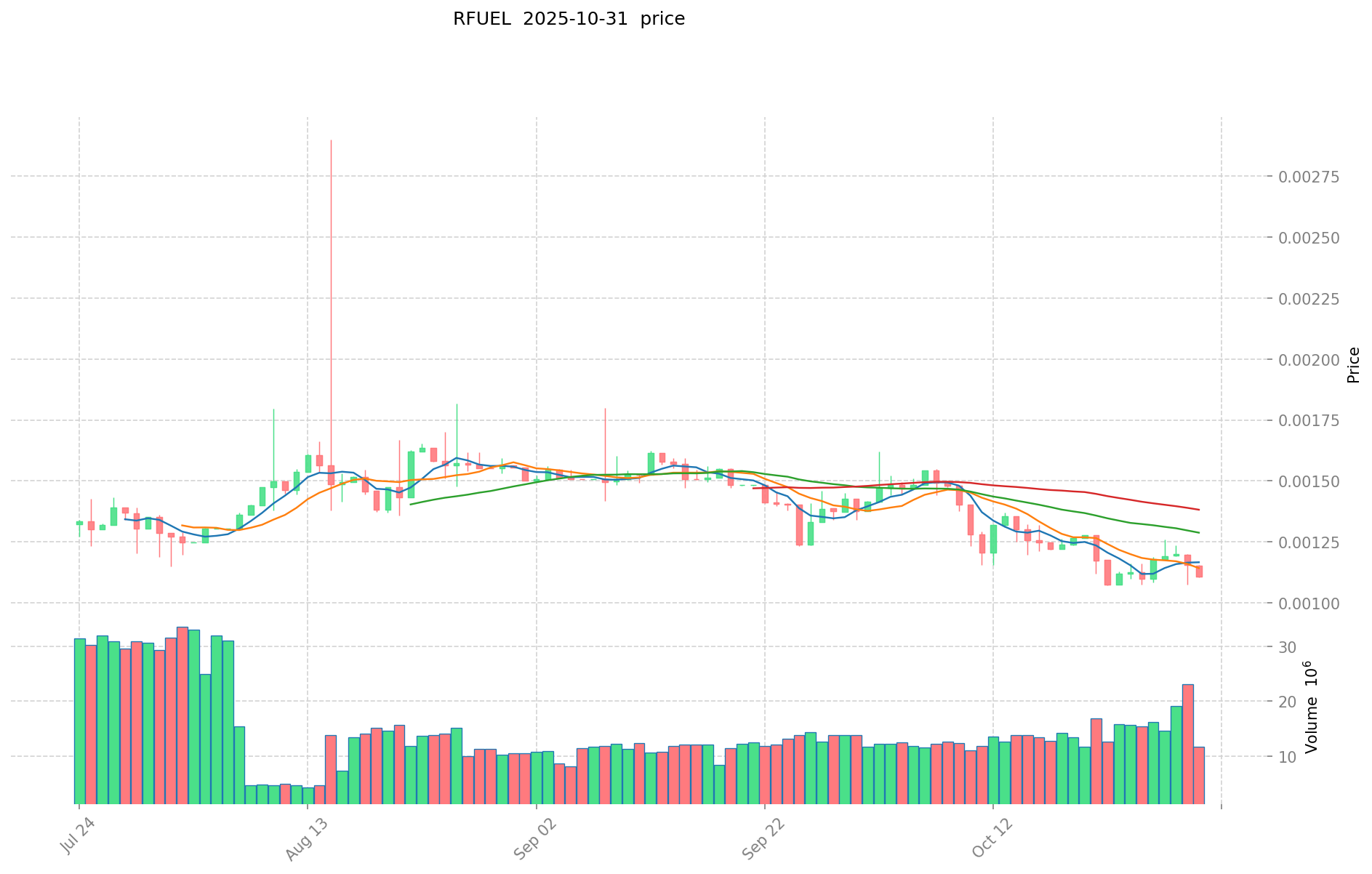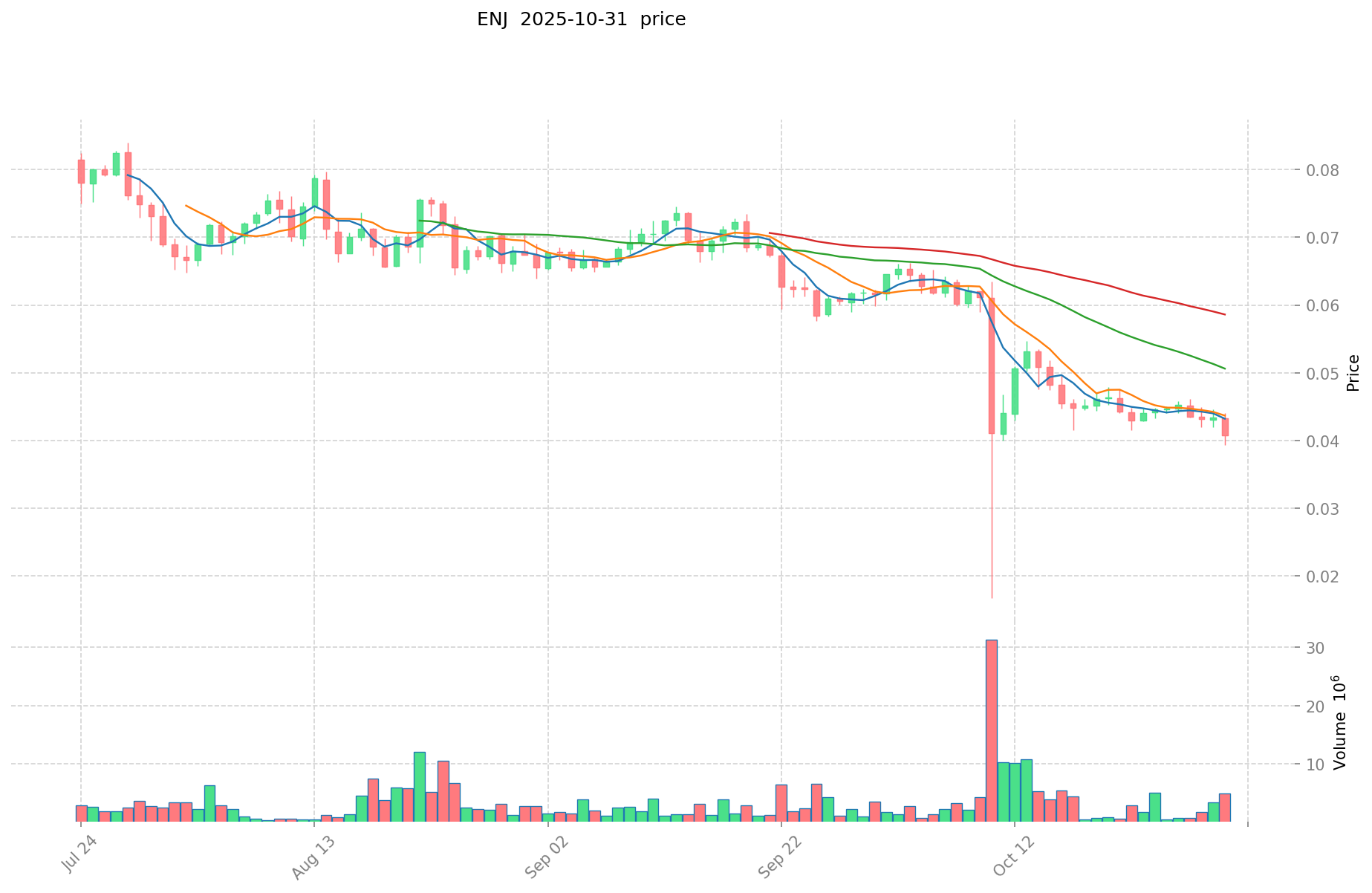RFUEL ve ENJ: Blockchain oyun sektörünün iki önde gelen tokeninin karşılaştırmalı analizi

Giriş: RFUEL ve ENJ Yatırımı Karşılaştırması
Kripto para piyasasında RFUEL ile ENJ arasındaki kıyaslama, yatırımcıların gündeminden düşmeyen bir konu haline gelmiştir. Her iki varlık, piyasa değeri sıralaması, kullanım alanları ve fiyat performansı açısından belirgin farklılıklar gösterirken, aynı zamanda kripto para sektöründe farklı pozisyonları temsil etmektedir.
Rio DeFi (RFUEL): Blokzincir ve akıllı sözleşmeler ile yeni nesil merkeziyetsiz finans altyapısı geliştirmesiyle piyasada tanınan bir projedir.
Enjin Coin (ENJ): 2017’de piyasaya sürülen ENJ, oyun endüstrisi için bir platform olarak öne çıkmış, küresel çapta yüksek işlem hacmi ve piyasa değerine sahip kripto paralardan biri olmuştur.
Bu makalede, RFUEL ve ENJ’nin yatırım değerleri; geçmiş fiyat hareketleri, arz mekanizması, kurumsal benimseme, teknolojik ekosistemler ve gelecek projeksiyonları üzerinden kapsamlı şekilde analiz edilecek, yatırımcıların en çok merak ettiği şu soruya yanıt aranacaktır:
"Şu anda hangisi daha avantajlı bir alım?"
I. Fiyat Geçmişi Karşılaştırması ve Güncel Piyasa Durumu
RFUEL ve ENJ Tarihsel Fiyat Eğilimleri
- 2020: RFUEL ana ağını başlattı, fiyatında dalgalanma görüldü.
- 2021: ENJ, NFT rüzgarı ile $4,82’ye çıkarak tüm zamanların en yüksek seviyesine ulaştı.
- Karşılaştırmalı analiz: 2022 ayı piyasasında RFUEL, $0,26095’ten $0,00005808’e gerilerken; ENJ $4,82’den $0,2384’e düştü.
Güncel Piyasa Durumu (31 Ekim 2025)
- RFUEL güncel fiyatı: $0,0011101
- ENJ güncel fiyatı: $0,04172
- 24 saatlik işlem hacmi: $9.398,49 (RFUEL) ve $137.530,00 (ENJ)
- Piyasa Duyarlılık Endeksi (Korku & Açgözlülük Endeksi): 29 (Korku)
Canlı fiyatları görüntülemek için tıklayın:
- RFUEL güncel fiyatı Piyasa Fiyatı
- ENJ güncel fiyatı Piyasa Fiyatı


II. RFUEL Yatırım Değerini Etkileyen Temel Unsurlar
Arz Mekanizması (Tokenomik)
- RFUEL: Sağlanan bilgilerde tokenomik ile ilgili detaylar sınırlı
- 📌 Tarihsel Görünüm: RioDeFi (RFUEL) güncel fiyatı $0,001153 USD, 24 saatlik işlem hacmi $22.018,93 USD
Kurumsal Benimseme ve Piyasa Uygulamaları
- Kurumsal Varlıklar: 2019’dan bu yana First Reserve fonuna ait olan market zinciri Refuel, satış dahil stratejik seçenekleri değerlendiriyor
- Kurumsal Benimseme: Potansiyel satış işlemi, Refuel’in borç dahil $1,5 milyar üzerinde değerlenmesini sağlayabilir
- Düzenleyici Durum: First Reserve, 2025’in ilk yarısında satış süreci için yatırım bankacılarıyla görüşüyor
Teknolojik Gelişim ve Ekosistem Oluşumu
- RFUEL Teknik Güncellemeleri: Block.cc üzerinden RFUEL (RioDeFi) ile ilgili; tanıtım, borsa, topluluk, explorer ve teknik doküman bilgisi sağlanıyor
- Ekosistem Karşılaştırması: Refuel, Güney Carolina, Kuzey Carolina, Texas, Mississippi ve Arkansas’ta 220’den fazla market işletiyor ve 3.000’in üzerinde çalışanı bulunuyor
Makroekonomik ve Piyasa Döngüleri
- Enflasyon Ortamında Performans: First Reserve yönetiminde, Refuel diğer market zincirlerini ve aile şirketlerini satın alarak büyüme kaydetti
- Makroekonomik Para Politikası: Yaklaşık $1,5 milyar değerleme, 10-15 kat kazanç çarpanını yansıtıyor ve piyasada primli bir değerlemeye işaret ediyor
- Jeopolitik Etkenler: Refuel’in olası satışı, sektördeki diğer market zincirlerinin satış girişimleriyle paralellik gösteriyor (ör. Arko’nun $2 milyar’lık satış hamlesi)
III. 2025-2030 Fiyat Tahmini: RFUEL ve ENJ
Kısa Vadeli Tahmin (2025)
- RFUEL: Muhafazakâr $0,001076 - $0,001110 | İyimser $0,001110 - $0,001398
- ENJ: Muhafazakâr $0,02588 - $0,04175 | İyimser $0,04175 - $0,05344
Orta Vadeli Tahmin (2027)
- RFUEL büyüme fazına geçebilir, fiyat aralığı $0,001283 - $0,001597 öngörülüyor
- ENJ büyüme fazına geçebilir, fiyat aralığı $0,03533 - $0,06514 öngörülüyor
- Temel itici güçler: Kurumsal sermaye girişi, ETF, ekosistem gelişimi
Uzun Vadeli Tahmin (2030)
- RFUEL: Temel senaryo $0,001563 - $0,001717 | İyimser senaryo $0,001717 - $0,001923
- ENJ: Temel senaryo $0,03908 - $0,07238 | İyimser senaryo $0,07238 - $0,08179
Feragatname
RFUEL:
| Yıl | Tahmini En Yüksek Fiyat | Tahmini Ortalama Fiyat | Tahmini En Düşük Fiyat | Değişim Oranı |
|---|---|---|---|---|
| 2025 | 0,001398726 | 0,0011101 | 0,001076797 | 0 |
| 2026 | 0,00173108994 | 0,001254413 | 0,00070247128 | 13 |
| 2027 | 0,0015972440729 | 0,00149275147 | 0,0012837662642 | 34 |
| 2028 | 0,001606797682308 | 0,00154499777145 | 0,000849748774297 | 39 |
| 2029 | 0,001859559317717 | 0,001575897726879 | 0,001181923295159 | 41 |
| 2030 | 0,001923855944973 | 0,001717728522298 | 0,001563132955291 | 54 |
ENJ:
| Yıl | Tahmini En Yüksek Fiyat | Tahmini Ortalama Fiyat | Tahmini En Düşük Fiyat | Değişim Oranı |
|---|---|---|---|---|
| 2025 | 0,05344 | 0,04175 | 0,025885 | 0 |
| 2026 | 0,0628254 | 0,047595 | 0,0428355 | 14 |
| 2027 | 0,065148036 | 0,0552102 | 0,035334528 | 32 |
| 2028 | 0,06198449154 | 0,060179118 | 0,04994866794 | 44 |
| 2029 | 0,0836820725349 | 0,06108180477 | 0,0360382648143 | 46 |
| 2030 | 0,081791590677268 | 0,07238193865245 | 0,039086246872323 | 73 |
IV. Yatırım Stratejisi Karşılaştırması: RFUEL ve ENJ
Uzun Vadeli ve Kısa Vadeli Yatırım Stratejileri
- RFUEL: DeFi altyapısı ve ekosistem potansiyelini önemseyen yatırımcılar için uygun
- ENJ: Oyun endüstrisi ve NFT sektörünün büyümesini amaçlayan yatırımcılar için uygun
Risk Yönetimi ve Varlık Dağılımı
- Muhafazakâr yatırımcılar: RFUEL %30, ENJ %70
- Agresif yatırımcılar: RFUEL %60, ENJ %40
- Koruma araçları: Stablecoin tahsisi, opsiyonlar, çapraz para portföyleri
V. Potansiyel Risk Karşılaştırması
Piyasa Riski
- RFUEL: Düşük piyasa değeri ve işlem hacmi nedeniyle yüksek volatilite
- ENJ: Oyun sektörü dalgalanmaları ve NFT piyasa duyarlılığından etkilenme
Teknik Risk
- RFUEL: Ölçeklenebilirlik, ağ istikrarı
- ENJ: Akıllı sözleşme açıkları, platformun benimsenmesine dair zorluklar
Düzenleyici Risk
- Küresel regülasyon politikaları, DeFi (RFUEL) ve oyun odaklı tokenlar (ENJ) üzerinde farklı etkiler yaratabilir
VI. Sonuç: Hangisi Daha Avantajlı Bir Alım?
📌 Yatırım Değeri Özeti:
- RFUEL’in avantajları: DeFi altyapısı odağı, ekosistem büyüme potansiyeli
- ENJ’in avantajları: Oyun sektöründe köklü konum, yüksek işlem hacmi ve likidite
✅ Yatırım Tavsiyesi:
- Yeni yatırımcılar: ENJ, daha köklü piyasa varlığı ve kolay erişim noktası ile tercih edilebilir
- Tecrübeli yatırımcılar: RFUEL ve ENJ’den oluşan dengeli portföy, risk toleransına göre ayarlanmalı
- Kurumsal yatırımcılar: Her iki proje için kapsamlı inceleme yapılmalı, yüksek likidite nedeniyle ENJ öne çıkabilir
⚠️ Risk Uyarısı: Kripto para piyasası yüksek volatiliteye sahiptir. Bu makale yatırım tavsiyesi olarak değerlendirilmemelidir. None
VII. SSS
S1: RFUEL ve ENJ arasındaki temel farklar nelerdir? C: RFUEL DeFi altyapısına odaklanırken, ENJ oyun endüstrisi ve NFT’lere yöneliktir. ENJ, RFUEL’e göre daha yüksek piyasa değeri, işlem hacmi ve likiditeye sahiptir.
S2: Tarihsel olarak hangi coin daha iyi fiyat performansı sergilemiştir? C: ENJ, 2021’de $4,82’lik zirvesiyle daha iyi bir fiyat performansı göstermiştir. RFUEL ise lansmandan itibaren daha dalgalı ve belirgin bir değer kaybı yaşamıştır.
S3: RFUEL ve ENJ’nin güncel fiyatları ve işlem hacimleri nedir? C: 31 Ekim 2025 itibarıyla RFUEL’in fiyatı $0,0011101 ve 24 saatlik işlem hacmi $9.398,49’dur. ENJ’in fiyatı $0,04172 ve işlem hacmi $137.530,00’dur.
S4: RFUEL ve ENJ için uzun vadeli fiyat projeksiyonları nasıl karşılaştırılıyor? C: 2030 yılında RFUEL’in temel senaryoda $0,001563 - $0,001923 aralığına ulaşması bekleniyor. ENJ ise aynı dönemde $0,03908 - $0,08179 aralığını görebilir.
S5: RFUEL ve ENJ yatırımlarının başlıca riskleri nelerdir? C: RFUEL, düşük piyasa değeri ve işlem hacminden ötürü daha yüksek volatilite riski taşırken, ENJ oyun sektöründeki dalgalanmalardan etkilenmektedir. Her ikisi de teknik riskler ve düzenleyici zorluklarla karşılaşabilir.
S6: Yatırımcılar portföylerini RFUEL ve ENJ arasında nasıl bölmeli? C: Muhafazakâr yatırımcılar için RFUEL %30, ENJ %70; agresif yatırımcılar için RFUEL %60, ENJ %40 dağılımı önerilebilir. Nihai portföy tercihi, risk toleransı ve hedeflere göre şekillenmelidir.
S7: Yeni yatırımcılara hangi coin tavsiye ediliyor? C: ENJ genellikle yeni yatırımcılara önerilmektedir. Çünkü RFUEL’e göre daha köklü piyasa varlığı, yüksek likidite ve kolay erişim sunmaktadır.

ALU ve FLOW: Modern makine öğrenimi uygulamalarında farklı hesaplama mimarilerinin değerlendirilmesi

2025 ALU Fiyat Tahmini: Piyasa Analizi ve Alüminyum Emtiası Trendlerine Yönelik Gelecek Perspektifi

ZCX vs ENJ: Oyun ekosisteminin iki önde gelen kripto para token’ının kapsamlı analizi

BTT ve ENJ: Blockchain sektöründe iki öncü oyun kripto parasının karşılaştırılması

Sekuya (SKYA) iyi bir yatırım mı?: Bu Yükselen Kripto Paranın Potansiyeli ve Risklerinin Analizi

FEAR (FEAR) yatırım için uygun mu?: Bu Kripto Para Tokeninin Potansiyeli ve Risklerine Dair Analiz

# Kurumlar Güncel Olarak Ne Kadar SOL Tutuyor: 2025 Varlıkları ve Fon Akışı Analizi







